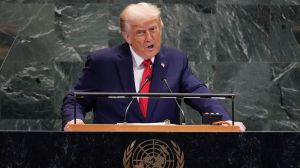Qualcomm refuses royalty cut for India
CDMA technology pioneer Qualcomm Inc today refused to lower royalties for handsets sold in India and sought to completely delink handset prices...

CDMA technology pioneer Qualcomm Inc today refused to lower royalties for handsets sold in India and sought to completely delink handset prices from the royalty payments it gets from handset manufacturers.
In a global webcast, senior Qualcomm executives turned on its head a recent claim by Indian telecom industry players that CDMA is an expensive technology for consumers to adopt because of these royalty payments.
Qualcomm President for India and SAARC Kanwalinder Singh, Senior Vice President Marketing Jeffery K Balk and VP and Division Counsel Technology Licensing Mike Hartongs were present during the webcast.
The executives stated that the real reason why Reliance, the top CDMA service provider in India with 21 million subscribers, is contemplating a move to GSM is because India’s spectrum allocation rules are ‘‘distorted’’ against CDMA technology.
‘‘Qualcomm’s understanding… is that spectrum policy in place in India is driving Reliance to rethink its technology evolution path. The spectrum policy in India allocates roughly twice as much spectrum to GSM operators as is given to CDMA operators,’’ they said. Earlier, the executives said, ‘‘The price reduction in the handsets is driven by factors other than royalty.’’
Driving home the point, company executives categorically said that Qualcomm’s licenses are issued to manufacturing firms and not to operators. Another comment that could make discussions between the Indian government and Qualcomm CEO Paul Jacobs difficult is the line that: ‘‘The royalty to handsets in India is one of the lowest in the world.’’
Next week, Jacobs is scheduled to meet the Communications Minister Dayanidhi Maran and is expected to meet senior executives of the two top CDMA service providers Reliance and Tata Teleservices as well. Both the operators are keen on lower royalties, while the government has in the past made the same point.
Indian operators have recently claimed that the total cost of owning a CDMA connection is higher than that of a GSM connection due to the high patent payments on CDMA handsets. But a shadow was cast on these claims today as a Korean handset manufacturer turned to the courts in protest to the royalty payment structure. The biggest mobile-phones manufacturer Nokia also decided not to go ahead with a proposed joint venture with Sanyo for CDMA handsets.
Nokia also said it would stop making phones based on CDMA, a likely date for which is April 2007, the time when Nokia’s CDMA handset license duration comes to an end. Nokia’s decision is partly the fallout of an ongoing tussle with Qualcomm’s licensing terms.
With Reliance Communications also turning on the heat, Jacobs is likely to face a lot more pressure to reduce royalties for India than a pre-visit webcast can take care of.
Photos



- 01
- 02
- 03
- 04
- 05




























